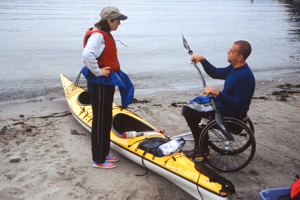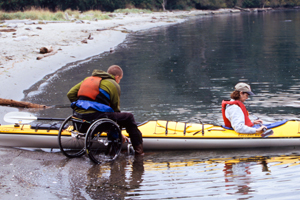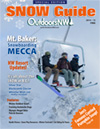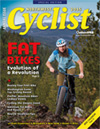Profile: Mike Passo
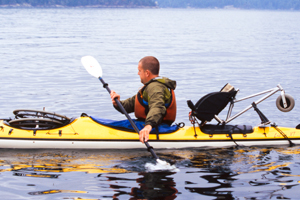
Paralyzing accident to paddling achievement
By Sue Hansen and Eric Hansen
Photo at right: Mike Passo paddling with his wheelchair stowed in front and behind. Photo by Eric Hansen
He’s in a wheelchair, but that’s not what draws attention to Mike Passo. It’s his athletic attributes that stand out.
When you first meet Mike, there’s no mistaking the physical strength in his broad shoulders, muscular arms and taut torso. There’s also an inner prowess projected in his eyes, showing a courageous competitor who never backs down from any challenge that comes his way.
Twenty years ago at the age of 19, Mike was mountain biking fast down a trail in northern Wisconsin when his front tire slipped sideways, flipping him over the handlebars. As he landed on his upper shoulders, the bike came down on top of him, breaking his back and giving Mike one of the most formidable challenges a person can face—losing the ability to use his legs.
For someone active in many outdoor activities, being paralyzed would undoubtedly limit the sporting pursuits Mike could participate in. But instead of focusing on what he couldn’t do, Mike let his injury introduce him to a watery world where his arms propel him into wild places.
“In order for me to get back outdoors, I discovered kayaking because you don’t need to use your legs except for getting in and out of the kayak,” Mike says. “Even without legs, I can lift myself from my wheelchair into and out of the boat.”
Becoming a skilled kayaker led to work for a Minnesota company called Wilderness Inquiry. Here, Mike led summer kayaking trips to ocean destinations for people with all ability levels. One favorite area was the San Juan Islands in Puget Sound. During this time, Mike decided living near the ocean would offer better employment opportunities.
His choice was Bellingham.
“Not only did I know the area well from my work with Wilderness Inquiry, I knew the owner of a kayaking company on Lopez Island called Elakah Expeditions,” says Mike. “When I moved to Bellingham, Elakah was for sale and I purchased it in 2003.”
Working with parks and recreation departments in several nearby communities, Mike expanded Elakah Expeditions to include day trips out of Bellingham as well as multi-day excursions off Lopez and Lummi Islands. Employing 10 kayaking guides besides himself, Mike tries to make every trip accessible to as many people as possible.
“I’m aware of different disabilities that people have and my company works hard to meet a person’s needs,” Mike says, “like putting a higher back support in a kayak for added comfort.”
Along with the extra attention to details to ensure a safe sea sojourn, Mike offers the chance to “test the waters physically,” especially on multi-day trips. This involves hauling gear and boats to the water’s edge, paddling all day, then setting up tents at sandy campsites and cooking meals each night. It can be exhausting, but that’s part of the kayaking experience: Pushing beyond personal limits to feel exhilaration.
Much inspiration can be drawn from a man who isn’t afraid of adventure. Watching Mike ready himself before a kayak trip is a lesson in endurance. Arriving in his kayak-laden truck near the put-in point at Odlin State Park on Lopez Island, Mike eases his body from behind the steering wheel onto the seat of his wheelchair. While those who are able to unload the kayaks do so and carry them to the shoreline, Mike pulls out large containers of life vests to pass out, as well as waterproof spray skirts to keep kayakers dry when sitting in the boat.
After instruction on proper paddling techniques, Mike ensures all those with him are securely seated in their kayaks before he wheels himself through the sand into the water. Placing a small pad on his kayak seat, he leans over the oval opening with fisted hands on the cushion. Lifting his body into the boat, Mike gently grabs each leg and tucks it inside the kayak. Dismantling his wheelchair, then strapping it onto the fiberglass hull, he pushes off with his paddle for a seafaring foray.
Every Elakah Expedition is educational.
“All our multi-day trips have themes with experts in the marine field,” Mike says. “One of the most popular is ‘Wild Harvesting’ with ethno-botanists who talk about what’s edible in the sea. Then they prepare a feast of sea food on the second night out.”
For a paddler’s palate, there are salty samples of spongy seaweed and sea lettuce, urchins and crab. However, according to Mike, sea cucumbers are the best tasting of all sea creatures.
“Sea cucumbers have five sets of muscles that are very tender,” he says. “When cooked in butter and garlic, they’re delicious.”
For added amusement, Mike paddles into a jungle of bull kelp, scooping up a bulbous stalk resembling a long whip with a round handle. When he breaks the big end open and blows into it with puckered lips, the hollow interior makes a deep-sounding horn. Bull kelp also makes great chowder and can be sliced into chunks and pickled.
Besides food facts, spotting sea life is part of every expedition—from flighty blue herons and kingfishers along island shorelines to sea ducks such as surf scoters and common mergansers. Curious seals pop their heads up out of the water for big-eyed glances and on occasion, orcas are sighted along with free-spirited river otters frolicking along the shore. The latter is a fitting symbol of Mike’s company since Elakah means “sea otter” in the native language of Chinook Indians.
As for the motto of Elakah Expeditions, it sums up Mike’s life so far: it’s all about the path, not the destination. For a man who turned a paralyzing accident into a paddling achievement, his path is a promising example of how obstacles can be overcome. As he effortlessly rides the rolling ocean waves in his kayak, Mike has learned to take things in stride, one paddle stroke at a time.
“After my mountain biking accident, there was never a point where I felt completely distraught. I knew being in a wheelchair would always be a challenge, but in a lot of ways I appreciate what happened. I became a kayaker because of it.”

